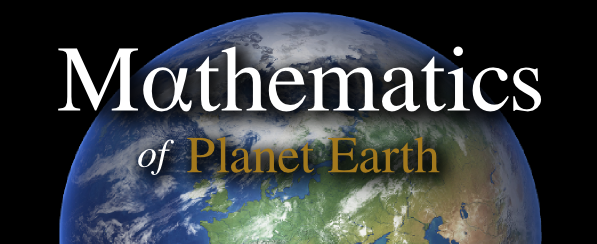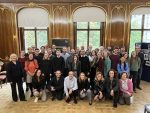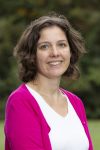To celebrate Earth Day, students from Cohort Echo of the Mathematics of Planet Earth Centre for Doctoral Training took the message of the importance of Climate Change into a local Secondary School. Groups of three or four students sent material about Earth Day, global warming and their own studies to four different Year 8 forms at Sir William Borlase’s Grammar School in Marlow. The pupils spent some of Earth Day, on the 22nd April, reviewing this material before sending their questions back to group members. The following week, each group linked up with their form for an hour long virtual session on the implications of Climate Change. CDT students had already prepared a five minute recorded speech each, to explain the most important aspects of this subject. After the Year 8 classes had watched these, their pre-sent questions were answered via a panel discussion between the students. There was also the opportunity for Year 8 pupils to ask questions live.
Lois was part of the first group to meet their class:
“We had a great experience chatting to the PSHE class. We were given some really well thought out questions beforehand, which helped guide the discussion. As well as an interesting conversation about climate change, the role of young people, and what the future holds, we also really enjoyed talking about further education in STEM. From some of the questions it was clear that there was some nervousness over the traditional ‘difficulty’ of some STEM subjects – and it was important for us to make it clear that there are so many different branches of climate science and STEM in general, and all require different skill sets. Studying what you enjoy and find interesting makes everything much easier!”
On Tuesday, Oliver Phillips’ group met 8B:
“It was a really enjoyable experience to speak to the students in 8B about the importance of studying climate science. Their enthusiasm was shown by the range of questions asked in advance, and their involvement in the discussion. Both showed how much they wanted to limit climate change and were eager to learn what action they could take. After a discussion of the submitted questions we finished with an optimistic ending of how hopefully serious action will be taken soon to limit the effects of climate change.”
Ryo’s group took the third of the lessons:
“I think our lesson went very smoothly with a ‘TV panel’ style format. We were given a very interesting set of questions, ranging from our motivations in studying a PhD to whether government-set targets in tackling climate change could be met. Asking each member of the panel about their thoughts on a question allowed for healthy debate and developed our own ideas- this is a vital part of science and it was great that we could convey this to the students!”
Finally on Friday Oliver Street’s group spoke to 8D:
“Having the opportunity to engage with a younger audience has enriched my presentation skills, as well as broadened my own outlook on climate issues. Answering the students’ specific questions was particularly rewarding, since this forced me to consider a different perspective on environmental issues from the viewpoint of a younger demographic.”
The Head of Key Stage 3 at the school, Craig Robertson, said of the lessons:
“The PhD sessions were excellent and had a really positive feel.”
Feedback from the pupils showed that they had benefitted from the experience.
Matthew from 8D said:
“The talks were interesting and really clear. It was great that the students were able to answer our questions. It was the best PSHE session ever, I really felt I learned something.”
Reported by: Cathie Wells- Cohort Echo.






